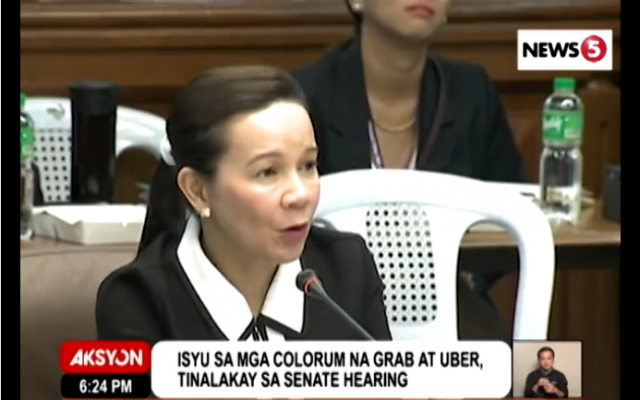The misgivings of conventional taxi drivers against the so-called transportation network vehicle services, exemplified by the operations of Uber and Grab, are piling up because of the perceived negative impact of these upstart services on their livelihoods.
At the Senate inquiry presided over by Senator Grace Poe into the state of the taxi cab sector, operators and drivers both spilled angst that, while they are tightly controlled by the Land Transportation Franchising and Regulatory Board (LTFRD), the rules governing the new players with their mobile application-driven service don’t seem to be marked with clarity and predictability.
Poe, chairperson of the Senate committee on public services conducted the hearing on ride-hailing or ride-sharing services to work on policies that will embrace innovation in the public transportation sector. She said she will work toward crafting a policy that will govern Uber and Grab, but vowed that the impending legal framework will consider public welfare and the common good.
“The public must be given more choices when it comes to transportation in the absence of improvements in the sector. Kailangan mag-adapt din tayo pero balansehin nang tama at maging patas ang gobyerno (We need to adapt but the government should achieve a balance by doing what’s right and fair),” said Poe.
Poe cited Article 1732 of the Civil Code which defines common carriers as “persons, corporations, firms or associations engaged in the business of carrying or transporting passengers or goods or both, by land, water, or air for compensation, offering their services to the public.”
She added the absence of a franchise is not a requisite for the incurring liability under the Civil Code provisions governing common carriers.
“If we want to move forward and craft legislation that is fair to all, then we should be forthright, respectful of the process and respectful to each other. Let’s respect each other, but we will be watching,” Poe said.
According to Atty Bong Suntay, President of the Philippine National Taxi Operators Association, “Co-existence must be on a level playing field; we cannot regulate one hand and deregulate the other. We can’t have rules for one sector and have none for the other. If we look at the service provided, it is the same for both, whether TNVS or taxis. We are both ferrying passengers for a fee.”
The conventional taxi sector point out that, while they are strictly bound by the operating envelope of the taxi meter, the TNVS players can dictate their rates.
This has prompted a clamor for conventional taxi operators to be allowed to raise their rates.
The TNVS sector, on the other hand, point out the improved riding experience that they are able to bring to the riding public, which is at the very core of their popularity.
Poe called on LTFRB to act on pending applications of Uber and Grab units with complete documents, and to come out with a decision on fare hike applications of regular taxis — which have been put on freeze for eight years despite inflationary and cost of living adjustments — by September.
Click and watch a video clip from the report, below:










